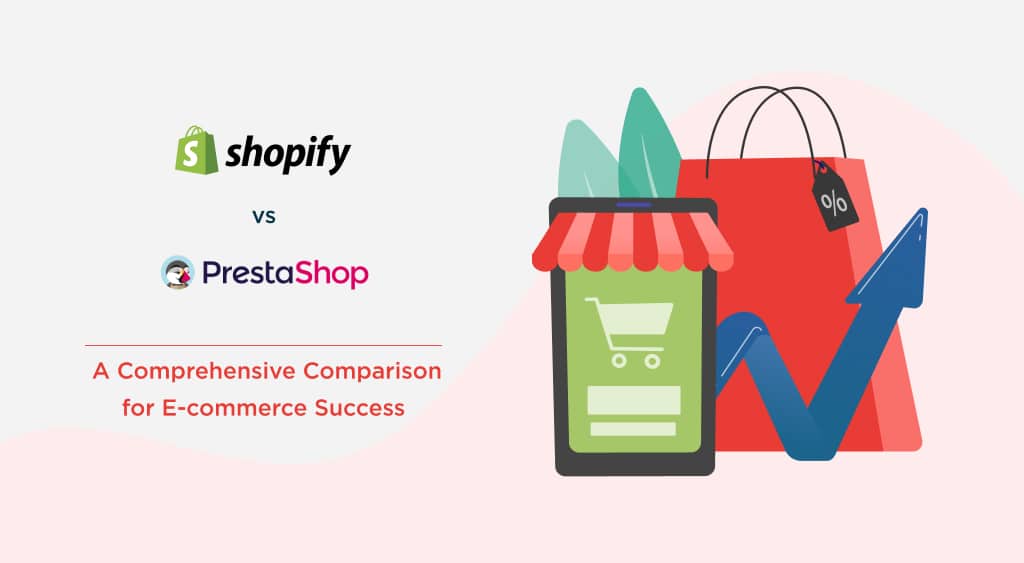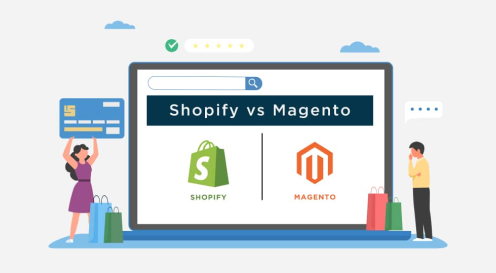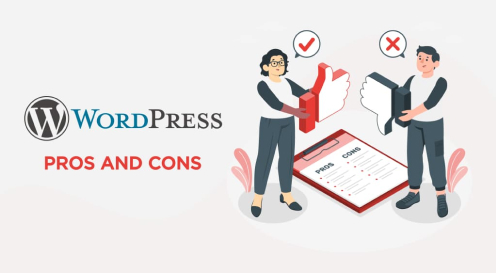Shopify vs PrestaShop: A Comprehensive Comparison for E-commerce Success
14 Mar 2024 | 9 min read
Introduction to E-commerce Platforms
Your online business success depends on choosing the right e-commerce platform in today’s rapidly evolving world. With numerous options available, it’s essential to understand the importance of selecting a platform that aligns with your needs and goals. Two popular e-commerce platforms that often come up in comparison are Shopify and PrestaShop.

Importance of Choosing the Right E-commerce Platform
It is critical to choose the right e-commerce platform for your business to grow and succeed and to select the proper forum. Manage your online store, process transactions, and engage the right platform.
The right e-commerce platform can offer several advantages, such as:
- User-friendly interface: An intuitive and user-friendly platform makes managing your online store, updating product listings, and handling customer orders easier.
- Scalability: As your business grows, you’ll need a platform to drive incredibly fit quickly, inventory, and order volumes. A scalable e-commerce platform allows you to expand your business seamlessly.
- Customization: The ability to customize your online store to match your brand identity and unique requirements can significantly enhance the customer experience and set you apart from competitors.
- E-commerce functionality: A robust set of e-commerce features, such as inventory management, secure payment gateways, and shipping integrations, can streamline your operations and enhance the overall shopping experience for your customers.
- SEO and marketing capabilities: An e-commerce platform that offers built-in SEO features and marketing tools can help improve your website’s visibility in search engines and drive more traffic to your online store.
Overview of Shopify and PrestaShop
An e-commerce platform like Shopify offers a user-friendly interface and comprehensive features. From small startups to large corporations, it caters to businesses of all sizes. With Shopify, you can quickly build and customize your online store, manage products, and process transactions. Your store can also have a variety of themes, extensions, and integrations.
PrestaShop, on the other hand, is an open-source e-commerce platform that provides a flexible and customizable solution for businesses. Among its features are order processing, customer management, and product management. PrestaShop allows users to customize their online stores fully and provides a marketplace with various themes and modules. It is trendy among small and medium-sized businesses seeking affordable e-commerce solutions.
In the following sections, we will delve into the key features, pricing, and plans of both Shopify and PrestaShop, providing valuable insights to help you make an informed decision when choosing the right e-commerce platform for your business.
Shopify: The E-commerce Giant
Regarding e-commerce platforms, Shopify stands as a prominent player in the market. Shopify’s robust features and user-friendly interface have made it popular among businesses of all sizes. Let’s explore Shopify’s key features and benefits, as well as its pricing and plans.
Key Features and Benefits of Shopify
Online businesses find Shopify appealing because it offers a variety of features. Some of the key features and benefits of Shopify include:
- User-Friendly Interface: Online stores can easily be set up and managed with Shopify’s intuitive interface. No technical expertise is required, allowing users to focus on their products and customers.
- Responsive Themes: Shopify offers a vast collection of professionally designed and mobile-responsive themes. Customers will enjoy a visually appealing and seamless shopping experience with these themes customized to your branding and style.
- Secure and Reliable: Security is paramount in e-commerce, and Shopify takes it seriously. With built-in SSL certification and Level 1 PCI compliance, Shopify provides a safe and reliable platform for online transactions.
- Abandoned Cart Recovery: Shopify’s abandoned cart recovery feature allows businesses to automatically send email reminders to customers who have left their shopping carts. This helps to recover potentially lost sales and boost conversion rates.
- App Store: The Shopify App Store offers various third-party apps and integrations. These apps can enhance the functionality of your online store, allowing you to customize and extend its capabilities according to your specific needs.
Pricing and Plans of Shopify
Depending on the size and budget of your business, Shopify offers different pricing plans. The plans include:
| Plan | Price (per month) | Features |
| Basic Shopify | $29 | Online store, unlimited products, 24/7 support |
| Shopify | $79 | Basic Shopify features, gift cards, professional reports |
| Advanced Shopify | $299 | Shopify features, advanced report builder, third-party calculated shipping rates |
In addition to these plans, Shopify offers a Shopify Lite plan for $9 per month, allowing businesses to add e-commerce functionality to an existing website or social media profiles. For larger enterprises with complex requirements, there is Shopify Plus, an enterprise-level solution with customizable features and dedicated support.
It’s important to note that while the pricing plans cover the core features of Shopify, additional costs may be incurred for transaction fees, credit card rates, and third-party app subscriptions.
Shopify’s comprehensive features, user-friendly interface, and pricing flexibility make it popular for businesses looking to establish and grow their online presence. However, it’s essential to consider your specific business needs, budget, and long-term goals when selecting an e-commerce platform.
PrestaShop: A Competitor in the Market
While Shopify may dominate the e-commerce platform market, other alternatives are available, including PrestaShop. PrestaShop is a robust and feature-rich platform that offers its own unique set of advantages.
Key Features and Benefits of PrestaShop
PrestaShop provides a comprehensive range of features that cater to the needs of online businesses. Some of the key features and benefits of PrestaShop include:
- Open-source: PrestaShop is an open-source platform, which means it is highly customizable and allows users to modify the code to suit their specific requirements. This flexibility enables businesses to create a unique and tailored online store.
- Large Community: PrestaShop boasts a large, active community of developers and users. Various free and paid add-ons and themes are available to enhance the functionality and design of your online store in this community.
- Multi-store Management: With PrestaShop, you can manage multiple online stores from a single admin panel. This makes it convenient for businesses that operate numerous e-commerce websites or have different product lines.
- Internationalization: PrestaShop offers built-in localization features, allowing businesses to quickly sell products in various languages and currencies. This makes it an ideal choice for businesses targeting international markets.
- SEO-Friendly: PrestaShop provides built-in SEO features that help optimize your online store for search engines. This includes customizable URLs, meta tags, and sitemaps, contributing to better visibility and rankings in search engine results.
Pricing and Plans of PrestaShop
One of the notable advantages of PrestaShop is its pricing structure. PrestaShop itself is a free and open-source platform. Setting up an online store incurs additional costs, such as web hosting, domain registration, and add-ons/extensions.
To enhance the functionality and design of your online store, PrestaShop offers a marketplace with free and paid modules and themes. The costs of these add-ons can vary depending on your specific requirements.
When considering the pricing of PrestaShop, it’s essential to evaluate your budget and the overall costs involved in running your online store. This should include hosting, domain, security, and any additional modules or themes you may need. By carefully assessing your needs and comparing the costs, you can determine if PrestaShop aligns with your budgetary requirements.
In the next section, we will compare Shopify and PrestaShop based on various aspects to help you make an informed decision. Stay tuned to find out which platform suits your e-commerce needs.
Comparison: Shopify vs. PrestaShop
You should compare different e-commerce platforms before choosing the right one for your online store. In this section, we will compare Shopify and PrestaShop in terms of ease of use and setup, design and customization options, e-commerce functionality and features, and SEO and marketing capabilities.
Ease of Use and Setup
Shopify is widely recognized for its user-friendly interface and intuitive setup process. It offers a straightforward and streamlined experience, making it easy for beginners to get started with building their online store. With a wide range of pre-designed themes and a drag-and-drop editor, Shopify allows users to customize their store without any coding knowledge. Additionally, Shopify provides extensive documentation and support resources to assist users at every step.
PrestaShop offers a bit more complexity in terms of setup and customization. It requires users to have a basic understanding of HTML and CSS to utilize its features thoroughly. While PrestaShop offers more flexibility in terms of customization, it may require more technical expertise to set up and manage effectively.
Design and Customization Options
Shopify provides a vast collection of professionally designed themes that cater to various industries and aesthetics. These customizable themes allow users to modify layouts, colors, fonts, and more. Shopify also offers a robust app store with a wide range of plugins and extensions to enhance the design and functionality of your store.
PrestaShop offers a similar level of customization with its collection of themes and modules. Users can choose from various themes and personalize them to suit their brand image. PrestaShop also provides access to a marketplace with additional modules and add-ons to extend the functionality of your online store.
E-commerce Functionality and Features
Both Shopify and PrestaShop offer comprehensive e-commerce features to support online businesses. Shopify provides a seamless shopping experience with inventory management, order tracking, payment gateways, and shipping integrations. It also offers built-in marketing tools, abandoned cart recovery, and social media integration to help drive sales and engage customers.
PrestaShop offers similar e-commerce functionalities, including inventory management, payment gateways, and shipping options. It also provides features like product attributes, customer reviews, and cross-selling capabilities. PrestaShop allows users to tailor their online store to their specific needs by choosing from a wide range of modules to enhance the functionality of their website.
SEO and Marketing Capabilities
Shopify prioritizes SEO and provides built-in features to optimize your store for search engines. It includes customizable meta tags, URL structures, and sitemap generation to improve the visibility of your online store. You can also reach a wider audience by integrating Shopify with social media platforms and email marketing tools.
PrestaShop also offers SEO-friendly features, allowing users to optimize their store for search engines. It provides options to customize meta tags, URLs, and alt tags for images. Additionally, PrestaShop supports integration with marketing tools and modules to enhance your online marketing efforts.
By comparing these critical aspects of Shopify and PrestaShop, you can determine which platform aligns best with your e-commerce requirements. When deciding, consider technical capabilities, SEO compatibility, and e-commerce functionality. Remember to assess your business needs and consider long-term scalability to ensure the chosen platform supports your growth.
Considerations for Choosing the Right Platform
When deciding between Shopify and PrestaShop as your e-commerce platform, there are several important considerations to remember. These include business size and scalability, budget and cost, support and resources, and integrations and add-ons.
Business Size and Scalability
Consider the size of your business and its growth potential. Whether you are a startup or a large corporation, Shopify offers plans to fit your needs. It provides scalability and flexibility, allowing you to upgrade your plan as your business expands quickly. On the other hand, PrestaShop is an open-source platform that offers more customization options, making it suitable for companies with technical expertise and a desire for complete control over their e-commerce store.
| Platform | Business Size | Scalability |
| Shopify | Small to Large | Highly Scalable |
| PrestaShop | Small to Large | Scalable with Technical Expertise |
Budget and Cost
Consider your budget and the associated costs of each platform. Shopify offers various pricing plans, including an essential program for startups and advanced techniques for established businesses. The pricing is transparent, with monthly hosting, security, and support fees. PrestaShop, being an open-source platform, is free to use. However, additional costs may be incurred for hosting, domain registration, and premium themes or add-ons.
| Platform | Pricing Model | Cost |
| Shopify | Subscription-based | Monthly Fees |
| PrestaShop | Open-source | Hosting and Add-on Costs |
Support and Resources
Evaluate the level of support and available resources provided by each platform. Shopify offers 24/7 customer support through various channels, including live chat, email, and phone. You can also seek guidance and connect with other Shopify users through a vibrant community forum. PrestaShop, an open-source platform, offers community-based support through forums and documentation. However, dedicated customer support may require additional costs or rely on third-party providers.
| Platform | Customer Support | Resources |
| Shopify | 24/7 Support | Extensive Knowledge Base, Community Forum |
| PrestaShop | Community-based | Forums, Documentation |
Integrations and Add-ons
Consider the availability of integrations and add-ons to enhance the functionality of your e-commerce store. Payment gateways, shipping providers, marketing tools, and more can all be integrated into Shopify’s app store. These integrations allow you to customize and extend your store’s capabilities. PrestaShop, as an open-source platform, offers a wide range of free and premium modules and themes that can be installed to enhance your store’s features. However, the availability and quality of these add-ons may vary.
| Platform | Integrations | Add-ons |
| Shopify | Vast App Store | Numerous Integrations |
| PrestaShop | Modules and Themes | Extensive Selection |
Considering these important factors, you can make an informed decision when choosing between Shopify and PrestaShop. Assess your business’s size and scalability needs, budget constraints, required support level, and the availability of integrations and add-ons. Remember to prioritize the specific requirements of your e-commerce store to find the platform that best aligns with your business goals.


